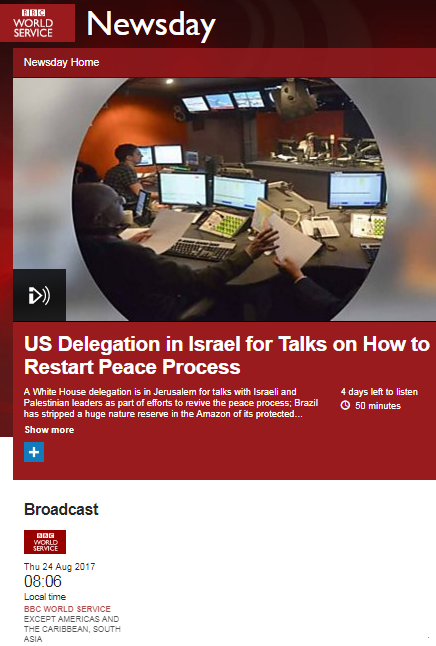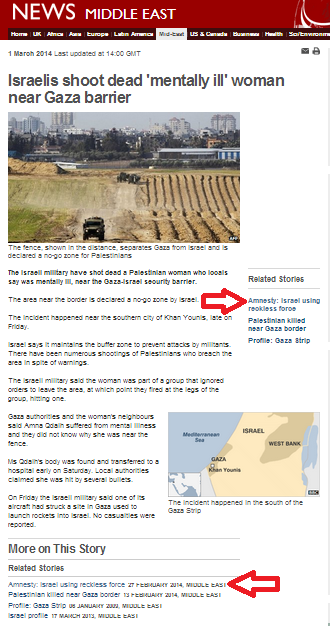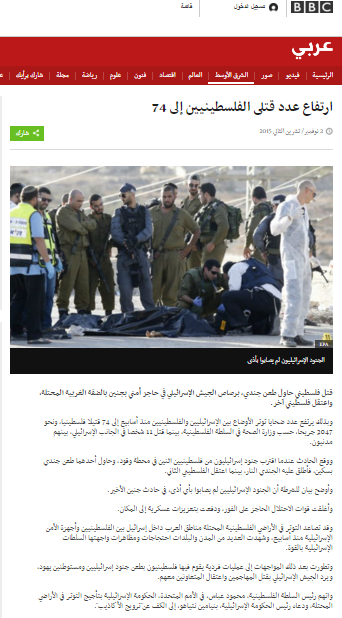For reasons best known to themselves the production team of the BBC World Service radio programme ‘Newsday‘ decided that their lead story on August 24th should be a US delegation’s visit to the Middle East. The item (from 00:38 here) was introduced by presenters Lawrence Pollard and Nomia Iqbal as follows:
[emphasis in italics in the original, emphasis in bold added]
Pollard: “So can the Trump administration pull the rabbit out of the hat and broker a peace deal between the Israelis and the Palestinians?”
Iqbal: “Huge question, isn’t it? But it’s what the US team on Mid-East tour is hoping to provide the answer to. Led by President Trump’s son-in-law Jared Kushner, they’ve been to Egypt, Jordan and now Israel for talks with the Israeli prime minister and the head of the Palestinian Authority.”
Pollard: “Behind them is the domestic row in the US over the president’s alleged slowness in condemning antisemitism and racism and ahead of them is what looks like a hardening of positions from both sides. Can the American team jump-start the so-called peace process? That’s our question this morning.”
Failing to provide any concrete examples to back up his claim of a “hardening of positions” on either the Israeli or Palestinian side, Pollard then signposted his interviewee’s legal qualifications, thereby encouraging listeners to regard her subsequent pronunciations on ‘international law’ as credible and accurate. He did not however inform listeners that Diana Buttu – now, among other things, a policy advisor for Al Shabaka – is a BDS supporter who thinks the Palestinian Authority should be disbanded.
Pollard: “Let’s speak now to Diana Buttu who is a former legal advisor to the Palestinian negotiations team in Ramallah, joins us now. Welcome to the programme. Both sides making demands, which is kind of what you’d expect before a round of negotiations. Just explain to us what the red line is on the Palestinian side.”
Buttu: “Well the red line is exactly what international law says, which is that settlements shouldn’t be constructed. I think it’s very important for people to keep in mind that what’s been happening during these negotiations is that the negotiations process, rather than serving as a mechanism for ending Israel’s military rule has actually served as a mechanism to facilitate it and to entrench it. Since negotiations began we’ve actually seen nearly a tripling of the number of Israeli settlers living illegally in the West Bank. So the position has and always will be that we cannot continue to negotiate while there’s a gun to our head…”
Pollard: “Right…”
Buttu: “…in the form of increased settlement activity.”
In addition to failing to clarify to listeners that Buttu’s claim regarding international law and the legality of Israelis living in certain locations is not the only interpretation of the fourth Geneva Convention, Pollard also refrained from telling his audience that the Oslo Accords – signed willingly by the PLO for which Buttu used to work – place no restriction whatsoever on construction or population in communities in Area C, the status of which is to be determined in negotiations. Pollard then resuscitated a twelve-year-old quote.
Pollard: “That raises the issue of how much of an honest broker the American team can be. I mean there are people who have been familiar with the inside of the American process who say, you know, what we’ve done in the past is we’ve been Israel’s attorney rather than both sides’ sort of honest broker. Do you think that Jared Kushner represents a change?”
Buttu: “Absolutely not. That phrase of Israel’s lawyer was one that was coined by Aaron David Miller who was involved with the Clinton administration. And the Clinton administration is no way like the Trump administration. At least then one could potentially say or probably say that there was some semblance of…of being objective – even though I would question that. But with the Trump team the mask is completely off. Jared Kushner himself is somebody who is a big supporter of the settlements. David Friedman – the US ambassador – is also a financial backer of the settlements. His daughter just immigrated to Israel taking advantage of a very racist Israeli law and has become an Israeli citizen. So I don’t…I’m not under any illusions whatsoever that the Trump administration is going to do anything. In fact I think what they’re going to do is either continue to provide a fig leaf or continue to entrench Israel’s military occupation.”
The Israeli law to which Buttu referred in that gratuitous reference to a person unconnected to the US administration is of course the Law of Return. Pollard refrained from challenging her portrayal of that law as “very racist”.
Pollard: “Give us an idea, from your point of view, has a strategy emerged? I mean those are pretty dark interpretations that you’re giving of American intentions. Has there actually been a series of policy statements that you could call a strategy or an idea or a road map forward?”
Buttu: “From…on the part of the Americans – yes, definitely. This is the first US president who has indicated that he intends to move the embassy from…from Tel Aviv to Jerusalem. This is again in violation of international law. This is a president who has completely turned a blind eye to Israeli settlement construction and while this may not be an actual plan, I think what it…what the Trump administration has made clear is that they’re not going to do anything to push Israel to end its now 50 year military rule and to stop the denial of freedom for Palestinians. So this is the plan that has been in place and on…in terms of what it is that the sides want, the Trump administration needs to look as though they’re actually doing something. The Netanyahu administration needs to look as though they’re actually doing something and within Israel all that they’re saying is provided that we look as though we’re engaged in a process but not actually doing anything, then the situation will be fine and that is not acceptable.”
Pollard failed to clarify to listeners that – as the BBC well knows – there has been no new “Israeli settlement construction” since Trump came into office or indeed for well over two decades before that. Neither did he bother to ask Buttu to clarify exactly which part of “international law” supposedly precludes moving the US embassy to Jerusalem or challenge her false claim that this is the first time a US presidential candidate has pledged to move his country’s embassy to Israel’s capital.
Pollard: “But…but there are people who…who are trying to be optimistic about this, who are kind of saying there’s going to be a new approach from Jared Kushner; he’s a real estate guy. Let’s treat it as a real estate approach; after all this is an issue about land ownership. Any fruits come from that approach?”
Buttu: “Not at all. This isn’t a real estate issue. This is an issue of rights and whether Palestinians have a right to live freely on their land or whether the world is going to continue to accept the denial of freedom of a people for yet another 50 years. So I don’t at all buy into this…”
Pollard: “Right…”
Buttu: “…theory that somehow Jared Kushner is going to be different. The question is not about the quality of the person but about what they’re empowered to do…”
Pollard: “Right…”
Buttu: “…what it is they intend to do and it’s clear that this administration is going to do nothing but kick the can down the road.”
Failing once again to clarify that the status of Area C is subject to negotiations and hence cannot accurately be described as “their land”, Pollard concluded with a repeat of his signposting:
Pollard: “You’re not going to be holding your breath by the sound of it. Diana Buttu; many thanks indeed for her take on the prospects of some breakthrough courtesy of Jared Kushner and the US team in the Middle East. Diana is a former legal advisor for the Palestinian negotiating team in Ramallah.”
Clearly BBC World Service audiences listening to this item did not benefit from accurate and impartial information that would enhance their understanding of the current situation regarding US efforts to restart negotiations between Israel and the PLO or the full range of issues to be tackled in such talks.
What they did hear, however, was unchallenged, politically motivated messaging from an inadequately introduced professional activist intent on persuading BBC audiences that the main – if not sole – factor of any importance in the Palestinian-Israeli conflict is ‘settlements’.
A later edition of ‘Newsday’ also led with the same story – but did listeners hear anything to balance this item? That question will be answered in part two of this post.
Related Articles:
Diana Buttu is at it Again, Harvard Edition (CAMERA)




